Is An Electric Car Right For You?
Are you ready to buy an electric car? For the everyday driver, here are answers to five questions that might help you determine if buying an electric car is right for you.
Thanks to Hyundai for sponsoring this post and helping us get around in San Francisco.
Update: Since writing this post, we have purchased an electric vehicle. Check out the electric vehicle reviews I shared, and all things we considered when looking for the best electric vehicle for our family. That new post is far more extensive than this one if you’re trying to decide if an electric car is right for your family.
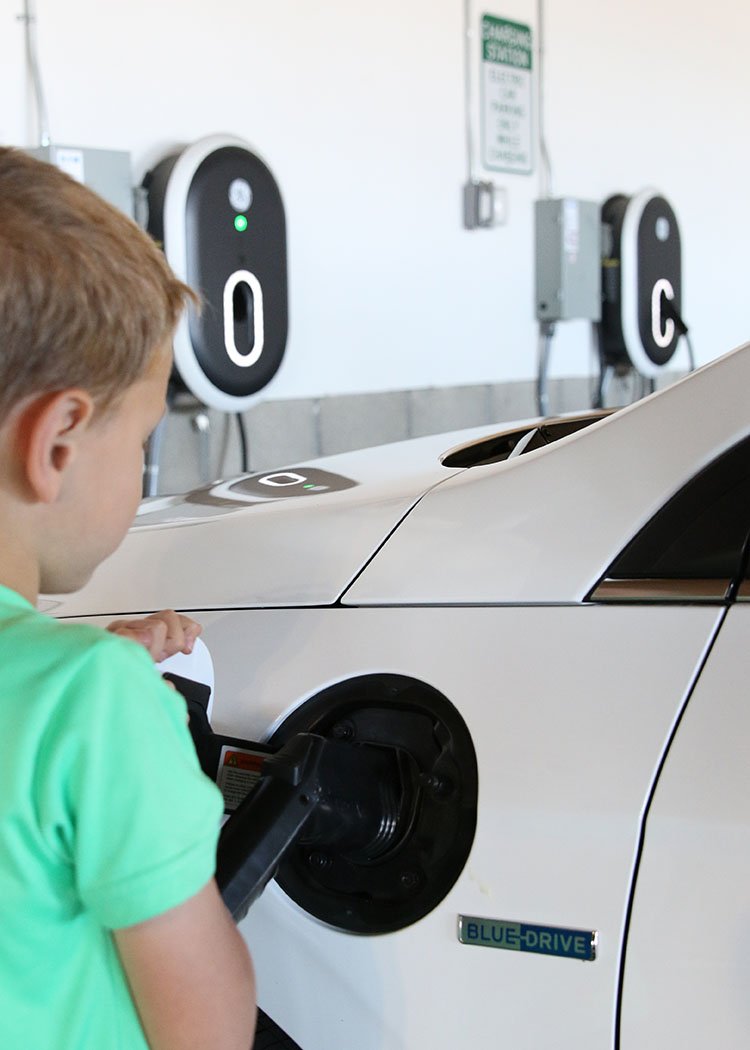
Have you driven an electric car before? Have you thought about buying one? I’ve been intrigued by the idea of buying an electric car but hadn’t really done much research nor had an opportunity to drive one. I had a lot of questions about electric cars given my limited knowledge about them and my perception of a limited infrastructure to support them.
While in California last week, I called ahead to our rental car company and requested an electric car. For the three days we spent in San Francisco, we drove a Hyundai Ioniq. My sister also drives an electric car. After driving both of them and learning more about how they work, I definitely think our next call will be electric.
Driving an electric car for several days helped me answer a lot of the questions I had about whether or not an electric car was really right for our family. I also did a bit of research to find out if it makes financial sense for us to get an electric car. Here are a few of the questions I had (that you may also have) and the answers I found through our experience and a bit of additional research.
5 Questions Answered To Help Determine if an Electric Car is Right For You
Are Electric Cars Difficult to Learn How To Use?
Just like any new car, hopping into an electric car for the first time requires a bit of a learning curve. We had to figure out how to charge the battery. We read the manual to ascertain how to read the dashboard so we knew when the battery was low, where to put the plug, when it finished charging, and whether it was running on battery or gas power.
Overall, I was impressed by how easy it was to figure out the nuances. After just a couple of days in the car, we were all set (and we didn’t get a fancy tutorial that I’m sure most dealers provide to customers when they buy or lease their own electric car).
What If The Battery Dies While I’m On The Road?
Currently, there are a few different types of “electric” cars that rely in varying amounts on the battery and the traditional engine. Until driving a fully electric car, this was all new to me.
If you want a car that runs, at least in part, on battery power, there are three different types available:
- Hybrid (no plug-in option)
- Electric (plug-in, fully electric, no gasoline)
- Plug-in Hybrid Electric (plug-in option but also can use gasoline)
There are other types of eco-friendly cars, like hydrogen-powered fuel-cell cars, but those aren’t quite as mainstream yet and out of scope for this discussion.
The Hyundai Ioniq, the car we received in California, comes in all three of the aforementioned models. We drove the Ioniq PHEV (plug-in hybrid electric vehicle). I was familiar with standard hybrid cars that charge themselves while driving but don’t have a battery I could charge at my discretion. Although they use battery power, they still use primarily gas and operate more like a traditional gas-powered car in many ways.
I expected battery-powered cars to run exclusively on electricity, so I had initial concerns about running out of charge, without a charging station around, while on the road. This might be true for pure electric cars, but the PHEV cars have gasoline as a backup resource.
Fully electric cars, however, typically can drive much further than the PHEV on a single charge, which is a trade-off for the gasoline function. But given that many parts of our country don’t have great charging station infrastructure just yet, the dual functionality offers peace of mind and convenience if you live in an area with limited charging infrastructure and can’t charge your car at home.
Because I live in an area where driving is really my only transportation option, I’m not sure I want to be limited by a car that couldn’t handle a full day’s worth of driving all around the city. I know we would likely invest in a charging station for our home if we buy an electric car, but that still hasn’t resolved my hesitations about extensive driving in a single day when I wouldn’t be home to charge the car.
Update: Since initially writing this post, battery life and charging station density have come a long way. Because we charge at home and won’t likely drive more than the 250-mile range of many electric vehicles, this isn’t really an issue as much as it used to be.
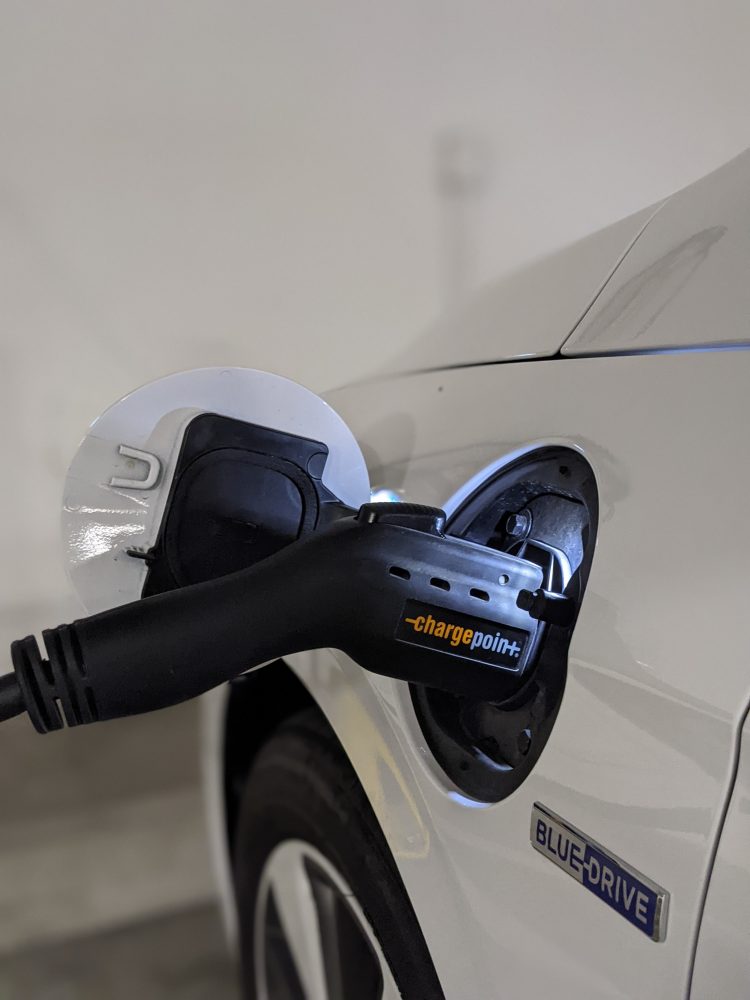
Surprisingly, I discovered that there are more charging stations than I realized. I’ve never needed to know about them, so I didn’t notice them in the past. There are several apps and websites that show where to find charging stations in a particular area.
I can easily type in a location, and it shows all the charging stations in the area, including the type of charging station. Some charging stations are free and others charge for use. Certain apps will distinguish those that are free, but not all apps have this functionality.
Some companies, like Target, are starting to put more charging stations in their parking lots. Our hotel in Redwood City also had charging stations, and they did not charge for use of them. They had six stations, so there were always plenty of stations available. We didn’t fill our car with gas the entire time we had the Hyundai Ioniq.
If you drive less than 200 miles a day and don’t need your car for road trips, you could probably be just fine with an all-electric car. Even if you travel, the charging infrastructure is growing significantly, so you may be able to manage if you pay attention to charging stations where you travel.
If charging stations are still few and far between where you live and you’re traveling more than 200 miles per day (i.e. so you can’t charge at home at night), the PHEV is probably the best option, though I suspect the battery life in the electric cars will only continue to get better.
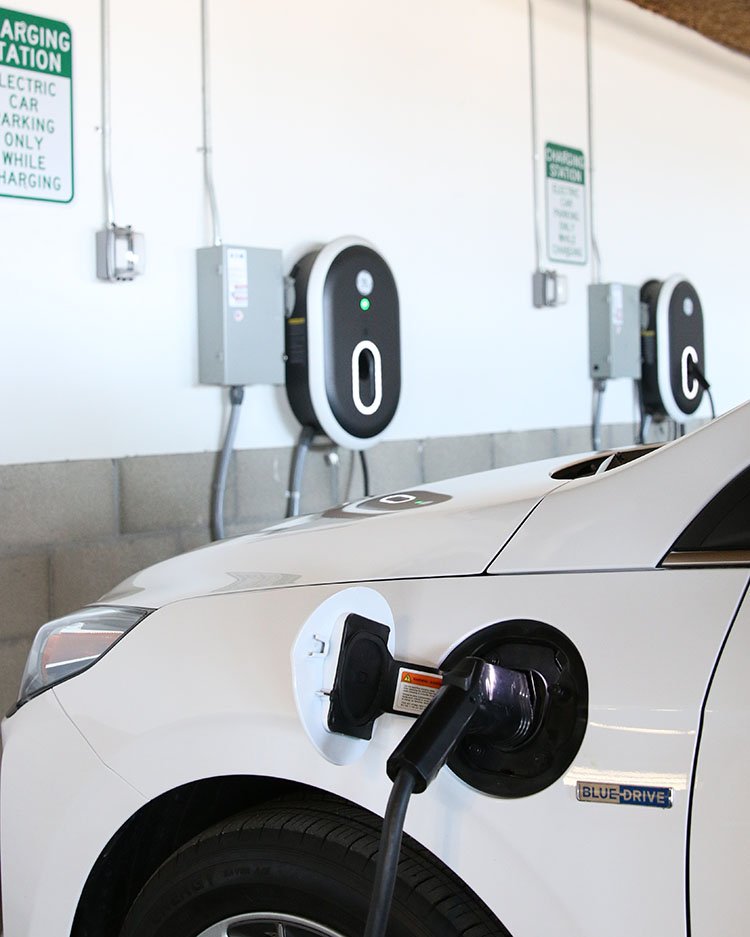
Are They Really Better For The Environment?
It’s generally accepted that the emissions from driving gasoline-powered cars harm our environment and contribute to climate change. Being reliant on foreign oil, when that’s the case, also creates geopolitical complexities. Transitioning cars to battery power from gasoline helps alleviate these issues of carbon emissions and foreign dependency.
But I’ve wondered if batteries create their own set of challenges. Are they really better? What chemicals are used in car batteries? What minerals are extracted to make car batteries? What happens to the batteries when they no longer work for the vehicles? Will we find creative ways to re-purpose, revitalize, and dispose of them so they don’t pile up in our landfills?
Batteries are Repurposed and Recycled
It turns out that car batteries have life long after they are needed in cars. They can help sustain the power grids, especially in conjunction with less reliable but more environmentally-friendly energy sources like solar and wind. Additionally, new batteries technology allows the batteries to be taken apart and fully recycled.
Gasoline Versus Electricity
From the perspective of energy production, gasoline usage is being offset by some process to create electricity. If electricity is being created by coal, for example, this might not be an entirely better alternative.
But as we develop more economically-sustainable green energy alternatives, the electricity used to power our cars will increasingly come from green energy sources like wind and solar power. The trade-off from gasoline to electricity today might not be a complete reduction of greenhouse gas from the vehicle, but transitioning to electric cars, in general, lends itself to more sustainable energy sources over time.
Can I Save Money Buying an Electric Car?
With more electric cars coming onto the market from a variety of manufacturers, cars are available at a spectrum of prices. While prices vary, the electric models aren’t all that much more expensive than their traditional counterparts. Such wasn’t the case a few years ago, but recently we’ve started to see more parity.
In some cases, a portion of the cost of an electric car is offset by government-funded tax credits to encourage consumer purchasing. Available credits depend on where you live, so be sure to check what you might qualify for when you’re getting a car.
Unless you live in a building or work at a location that has shared charging stations, you’ll likely want to purchase a home charging station. It’s not necessary, per se, if you can find places around where you live to charge your car. For most of us, however, charging at home is hugely more convenient than consistently charging elsewhere.
With respect to ongoing expenses, gasoline costs decrease but electric bills will offset at least part of this expense-saving. My sister, who lives in an apartment complex, pays to use the charging stations in her building. The charging station usage fees mostly offset the savings she has accrued from having to buy far less gasoline. For someone with lower electricity fees who charges their car at home primarily, you can expect more substantial savings.
What Are Maintenance Costs?
Electric cars are much simpler than traditional cars. While traditional cars may have hundreds or even thousands of parts, electric cars don’t need most of the parts that power a traditional combustion engine. Electric cars don’t require oil changes, for example, and have less scheduled maintenance.
Studies have shown that maintenance costs are lower by about 35% or so, on average. For those planning to drive an electric car just for the first few years of its life, maintenance costs are almost certainly lower than traditional cars.
Like our phones and computers, however, electric car batteries slowly lose their ability to charge over time. Eventually, the car battery will need to be replaced and these are pretty pricey. If you were to buy an electric car today, it would probably be several years before you need to replace the battery. By then, the cost will almost certainly be lower than it is today, but it’s fair to expect that a new battery might cost several thousand dollars.
Because the technology is relatively new to the mass market, many auto body shops don’t know how to service electric cars. There are a growing number of programs to fill the market with knowledgeable service technicians. For now, however, you may have to take your car to the dealer for service, which can be more expensive than local auto body shops.
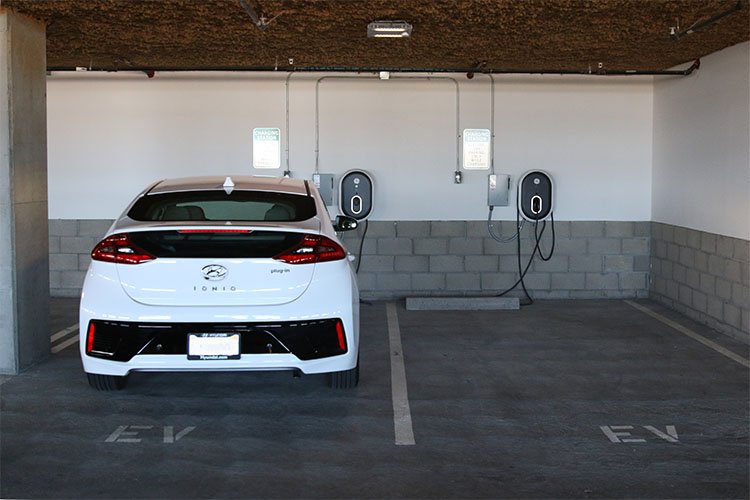
Does The Car Drive and Function As Well?
Consistent with a wide range of price points, electric cars now come in a variety of performance levels. Some of the most expensive models drive like sports cars while some of the more economical ones aren’t exactly speedsters.
Based on our experience, the quality of the drive doesn’t change solely by switching from a gasoline-powered engine to a battery-powered engine. Electric cars go from 0-60 pretty quickly, but they operate pretty similarly to their traditional counterparts once they get going.
The battery doesn’t create the revving sounds we’ve come to expect from a traditional combustion engine. It took a bit to get used to the car being so quiet both when starting and driving it. The first time I drove the Hyundai Ioniq, I turned the car on and off a couple of times before shifting into reverse because I wasn’t sure it was actually on.
Car manufacturers have continued to find better ways to “hide” the battery as well. I know some of the hybrid cars from a couple of years ago had large batteries that took up a good portion of the trunk. Both the Ioniq and my sister’s car had spacious trunks and no signs of batteries taking away from the functional space of the vehicle.
All in all, the electric motor might cause the car to drive a bit differently, but not really any better or worse (at least for everyday drivers). Much like buying a traditional car, the quality of the ride will depend largely on the brand you choose to buy and will be consistent with that brand’s other models.
So Am I Convinced?
I knew when we scheduled our trip to California that it would be the perfect opportunity to get a taste of driving an electric car. If there was one area I was sure had sufficient infrastructure for electric cars, it had to be the Bay Area.
I’m really glad we got a chance to check out the Hyundai Ioniq and drive an electric car for several days. It helped quell some of my hesitations about driving an electric car and was the impetus to do the bit of extra research to learn more about the real economic and environmental costs and benefits of making the switch.
The current lease on one of our cars expires in about a year, so then we will be ready to make the leap into our next car. For now, I’m nearly certain it will be an electric model. Now I just need to determine if we will need a plug-in hybrid or if a true electric car will work. The PHEV feels much more practical, but a fully electric car is rather enticing.
Update: We paid a deposit on an electric car that we are getting in a few months after pushing back our investment in an electric car for a couple of years. More on that in the linked posts if you’re curious.
Have you driven an electric car before? If not, what are your hesitations about making the switch?

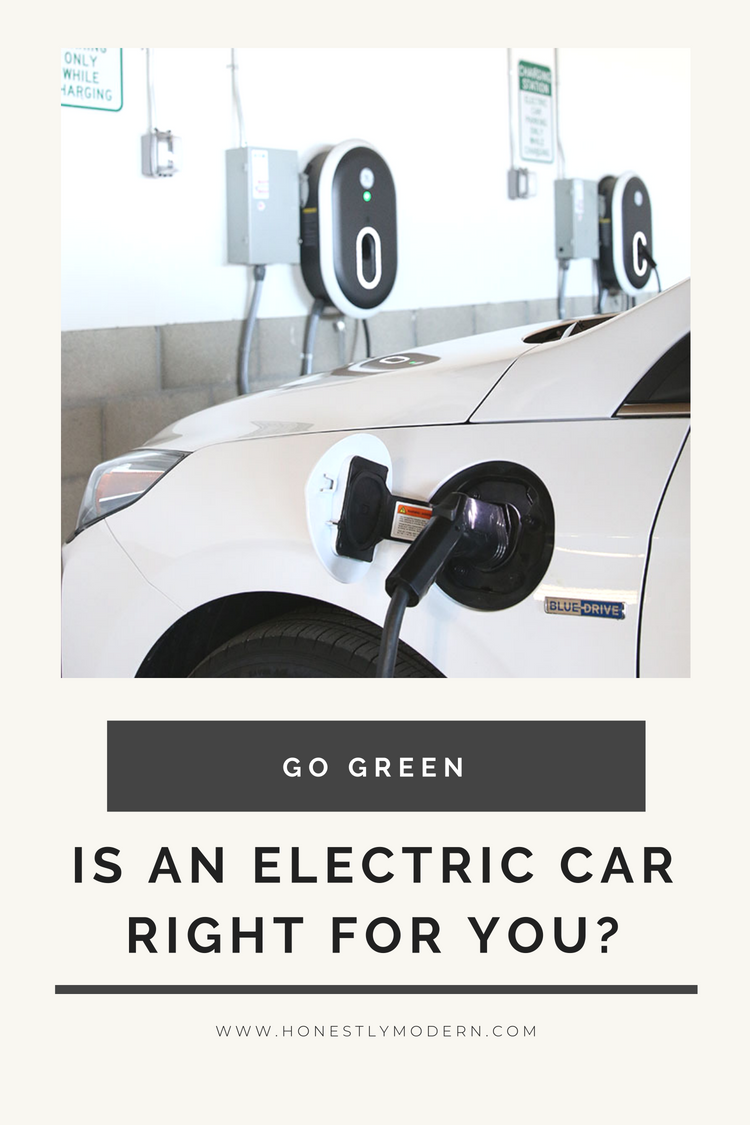



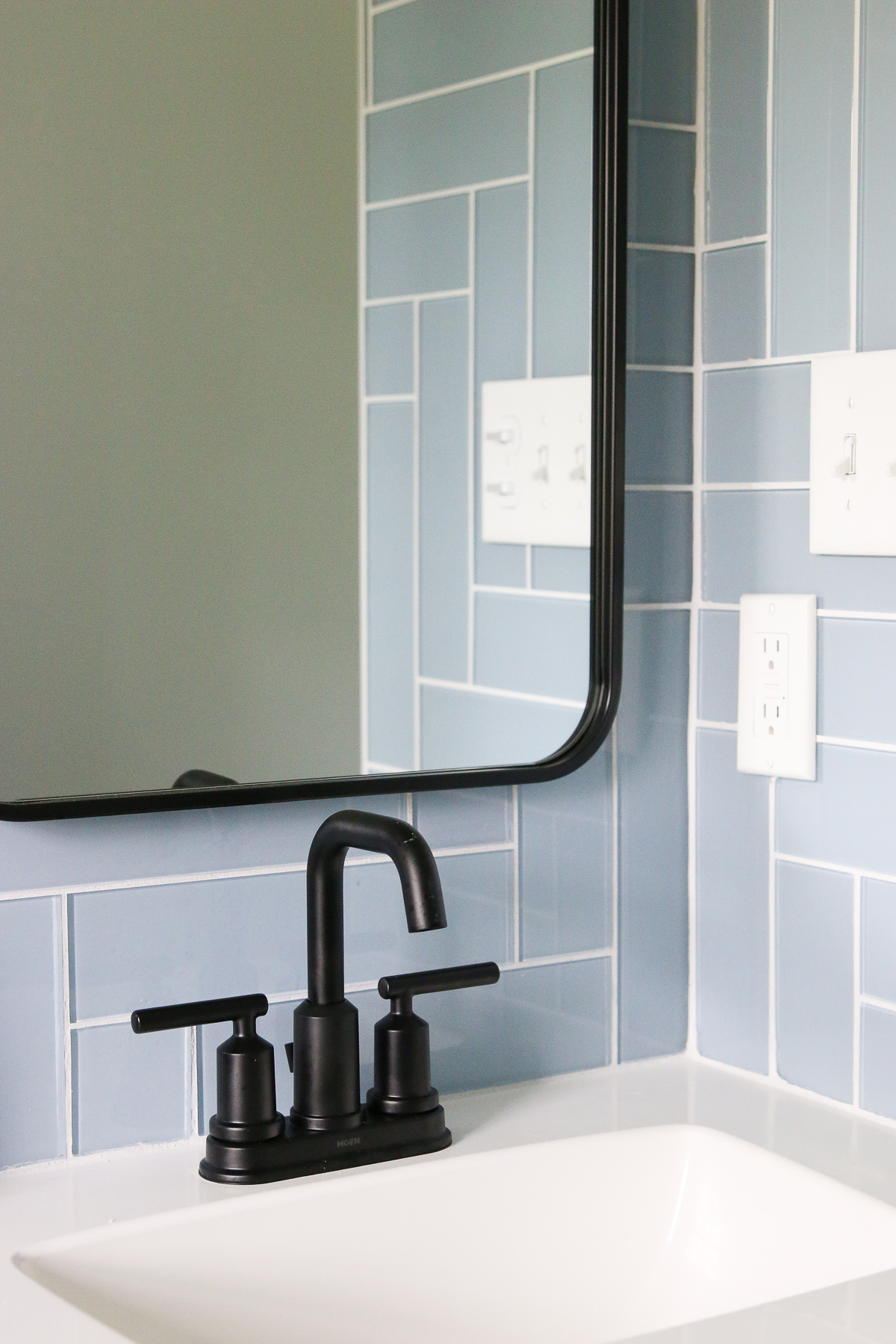




Even if the electricity used is coming from coal, it’s still better for the environment than conventional gas cars. This is because electric car engines are more efficient (so less coal burned for the same distance as how much gas is burned in a conventional engine). I learned this from my professor who is an expert in materials and energy. Other than that, this article is on point!
Thanks Mariah for sharing this! I really appreciate the additional insight, and I am sure readers do as well.